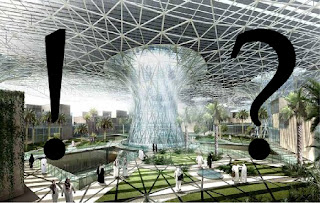Masdar is a 15 billion dollar project begun by the city of Abu Dhabi. It is inteded to be a carbon neutral city of the future. They will be considering every effect on the environment a city has, and making sure all systems are as efficient as can be: recycling wherever possible, using sustainable materials, harvesting wind and solar power, and you can imagine the list goes on.
Sounds like a fine idea doesn't it?
Well, it's not.
It is misguided. Abu Dhabi is one of the least environmentally friendly cities in the world. There are no recycling systems, no grey water facilities, no standards for efficient cooling or lighting in buildings, it basically ignores every aspect considered at Masdar. There are giant dump trucks that form a steady stream of waste (much of it very recyclable) that is buried in the desert 100km out of town. Abu Dhabi has the highest co2 per capita in the world. It also uses the most water per capita IN THE WORLD.
Surprised?
So where does that leave Masdar? Is it a revolution in thinking? Nope, its a show off contest. The thing to show off these days just happens to be environmental.
The trouble with this is that the real issues are ignored. What use is building a new green 'city' (more like token neighbourhood) when the rest of the city continues to be the worst environmental offender in the world?
It reminds me of the argument that we ought to try to colonize new planets because ours is spoiled. It's just not feasible. (Don't get me wrong I'd like to colonize other planets, we just don't have the resources, not at this rate of depletion in any case, but I digress...)
In short; fix the problems that already exist. Waving a big, 15 billion dollar eco-friendly flag around is not going to solve anything. Just imagine what 15 billion could do to any of the failing systems here (ie. education, environment, traffic, etc.).
(Note: The original post has been edited to fit this climate)
Sounds like a fine idea doesn't it?
It is misguided. Abu Dhabi is one of the least environmentally friendly cities in the world. There are no recycling systems, no grey water facilities, no standards for efficient cooling or lighting in buildings, it basically ignores every aspect considered at Masdar. There are giant dump trucks that form a steady stream of waste (much of it very recyclable) that is buried in the desert 100km out of town. Abu Dhabi has the highest co2 per capita in the world. It also uses the most water per capita IN THE WORLD.
Surprised?
So where does that leave Masdar? Is it a revolution in thinking? Nope, its a show off contest. The thing to show off these days just happens to be environmental.
The trouble with this is that the real issues are ignored. What use is building a new green 'city' (more like token neighbourhood) when the rest of the city continues to be the worst environmental offender in the world?
It reminds me of the argument that we ought to try to colonize new planets because ours is spoiled. It's just not feasible. (Don't get me wrong I'd like to colonize other planets, we just don't have the resources, not at this rate of depletion in any case, but I digress...)
In short; fix the problems that already exist. Waving a big, 15 billion dollar eco-friendly flag around is not going to solve anything. Just imagine what 15 billion could do to any of the failing systems here (ie. education, environment, traffic, etc.).
(Note: The original post has been edited to fit this climate)




